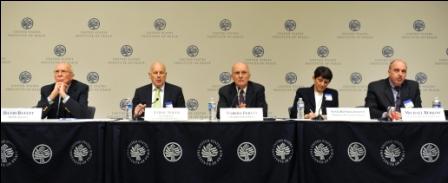Police Corruption
Police corruption is a universal challenge in peacebuilding. On November 16, 2011, USIP hosted a panel of distinguished experts who discussed the root causes and potential remedies.

Police corruption is a universal challenge in peacebuilding. It wastes resources, undermines security and justice, slows economic development, and alienates citizens from their governments. Some experts argue that efforts to curb police corruption are hopeless, or at best secondary. Others maintain that attacking oppressive, unfair abuses is where reform efforts must start. On November 16, 2011, USIP hosted a panel of distinguished experts who discussed the root causes of and potential remedies for police corruption. This public event introduced a new USIP Special Report entitled “Police Corruption: What Past Scandals Teach about Current Challenges."
Speakers
- David Bayley, Panelist
Distinguished Professor and Former Dean of the School of Criminal Justice, State University of New York at Albany
Co-author, USIP Special Report “Police Corruption: What Past Scandals Teach about Current Challenges” (2011)
Co-author, The Police in War: Fighting Insurgency, Terrorism, and Violent Crime (2010) - Michael Berkow, Panelist
Former Chief of the Savannah Chatham Metro Police Department
Former Deputy Chief of the Los Angeles Police Department - Sanja Kutnjak Ivković, Panelist
Professor, School of Criminal Justice, Michigan State University
Author, Fallen Blue Knights: Controlling Police Corruption (2005) - Athol Soper Panelist
Assistant Commissioner, New Zealand Police, United Nations Police, U.N. Department of Peacekeeping Operations - Robert Perito, Moderator
Director, Security Sector Governance Center, U.S. Institute of Peace
Co-author, USIP Special Report “Police Corruption: What Past Scandals Teach about Current Challenges” (2011)
Co-author, The Police in War: Fighting Insurgency, Terrorism, and Violent Crime (2010)
Explore Further
- Event Video: Police Corruption
- Special Report: Police Corruption
By David Bayley and Robert Perito | November 2011 - USIP's Security Sector Governance Center
- Read the event coverage, Triage, Bootstraps and Police Reform
Related Academy Courses
- Supporting Police Reform: Capacity Building for Advisers and Trainers
- Rule of Law Practitioners Course
- Negotiations from Checkpoints to High Politics



